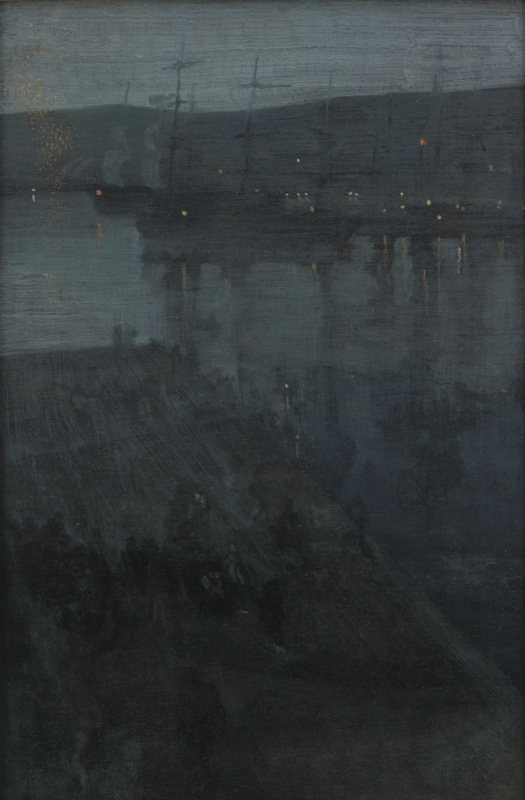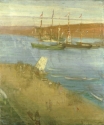Composition
This is one of 'the three Valparaiso pictures that are known', as Whistler told the Pennells. 1 The other two are Symphony in Grey and Green: The Ocean [YMSM 072] and Crepuscule in Flesh Colour and Green: Valparaiso [YMSM 073].
With its nocturnal atmosphere and additional figures on the pier, it is the most elaborate of the three upright compositions of Valparaiso painted by Whistler (see The Morning after the Revolution, Valparaiso [YMSM 075] and Sketch for 'Nocturne in Blue and Gold: Valparaiso Bay' [YMSM 074]).
It is possible that Whistler worked on Nocturne in Blue and Gold: Valparaiso Bay in the early 1870s, and that it was the unfinished Valparaiso picture referred to a letter from Whistler to Alfred Chapman on 2 July 1874. 2
The main differences in detail between The Morning after the Revolution, Valparaiso [YMSM 075] and Nocturne in Blue and Gold: Valparaiso Bay are the omission in the latter of the small boats by the pier, and of the white sail on the foremost ship. The angle of the pier is also different, being more steeply angled in Nocturne in Blue and Gold: Valparaiso Bay and in Sketch for 'Nocturne in Blue and Gold: Valparaiso Bay'. The obvious difference between Nocturne in Blue and Gold: Valparaiso Bay and the other Valparaiso paintings is that it is a very dark Nocturne.
Technique
The matrix pigment was established as white lead.
Bernhard Sickert (1862-1932) noted in 1908 that the canvas appeared to have been primed in black, and the crepuscular blue glazed over it. 3
The detailed and sensitive description of Nocturne in Blue and Gold: Valparaiso Bay by Gustave Geffroy (1855-1926) in 1890 suggests that the details of the scene were then clearer than they are now:
'une jetée s'avance au-dessus d'une eau d'un bleu pâle. Des personnages vont et viennent, ils sont d'un noir transparent, leurs vêtements plus clairs sont des taches livides … Sur l'eau, des bateaux se profilent en coques et en mâtures, striés de feux rouges, jaunes, bleus, blancs. Un pluie d'étincelles espacées tombe ... La nuit est claire.' 4 Translation: 'a pier juts out over water of a pale blue. People come and go, they are of a transparent black, their lighter clothes are livid spots ... On the water, boats appear in hulls and masts, streaked with red, yellow, blue and white lights. A shower of scattered sparks falls … The night is clear.'
Conservation History
The quotations published in the Goupil exhibition catalogue in 1898 suggest that the picture had darkened; the Western Morning News on 5 March 1898, for example, wrote:
'A dark blue patch in the left hand corner eventually becomes more defined until it is seen to be a pier crowded with people watching the phantom ships at anchor in the harbour ... One detects a flaw in the top corner of the picture before one has grown conscious that it is the spray from a spent rocket.'
These reviews confirm the evidence of early photographs (including those dating from 1892 and about 1898 reproduced above) that the condition of the painting had deteriorated.
The Freer conservation files mention that the surface had been abraded, and showed signs of frequent cleanings. In 1965 the entire painting was cleaned of old varnish and retouches by Ben Johnson, and it was then restretched, revarnished and inpainted.
Frame
Flat Whistler frame, date unknown. 5
Last updated: 5th June 2021 by Margaret












